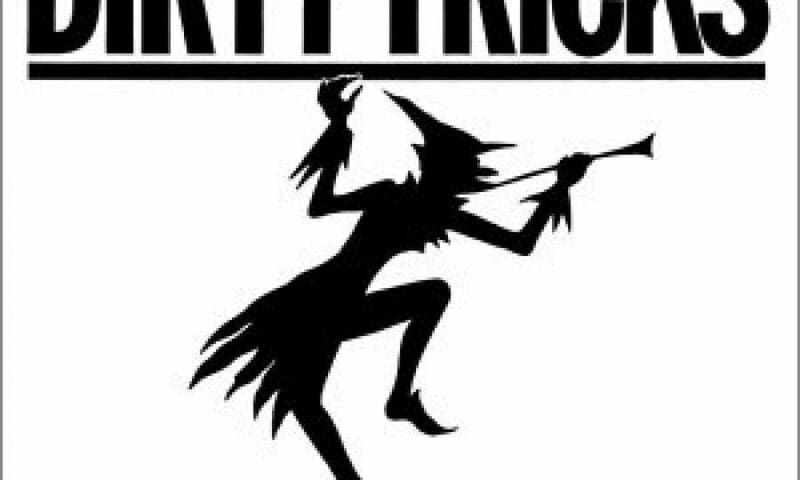

 To paraphrase Dostoyevsky on the subject of Gogol’s overcoat, All conservative pranksters have crawled out of Donald Segretti’s bag of dirty tricks.
To paraphrase Dostoyevsky on the subject of Gogol’s overcoat, All conservative pranksters have crawled out of Donald Segretti’s bag of dirty tricks.
Segretti, of course, was the Nixon operative who specialized in “ratfucking” – waging covert political warfare designed to embarrass Democrats running for office through forging inflammatory letters in their names and other deceits. Convicted as a Watergate conspirator, Segretti faded from history but his antics would be refined and expanded upon by Karl Rove and, later still, by James O’Keefe, who infamously showed up at ACORN offices impersonating a pimp in order to discredit the nonprofit group.
New York Times writer Michael Powell now presents an alarming overview of how contemporary ratfuckers have geared up to sabotage progressive organizations and political candidates. The piece revolves around John M. Howting, a young man who recently walked into the offices of a community action group,
» Read more about: WebHot: Political Dirty Tricksters Exposed »
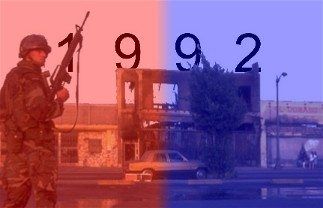

This month Frying Pan News is presenting personal stories of the April 29-May 4, 1992 explosion that has been called everything from a riot to a rebellion. These recollections do not represent the point of view of this blog or its sponsor, the Los Angeles Alliance for a New Economy. They do, however, present snapshots of a moment in a city’s troubled history — as well as opinions about how far we still need to go to make Los Angeles work.
Today’s post comes from Mike Davis, author of City of Quartz and Ecology of Fear. He teaches creative writing at U.C. Riverside.
A Tale of Two Riots
I was protesting at Parker Center when the Simi Valley verdict was announced. I spent the evening in South Central, talking to people and watching the fires.
» Read more about: 1992 Remembered: Mike Davis' Tale of Two Riots »
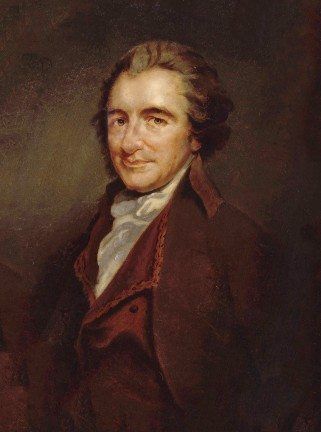

Last year I wrote a one-man play that I perform called To Begin the World Over Again: The Life of Thomas Paine. It’s about the one truly radical Founding Father whose greatest vision was for genuine equality. Paine called for an end to slavery, as well as for all men to vote, and suggested equal rights for women – all outrageous propositions for his time. Yet in the process of writing my play I discovered just how politically isolated we are from one another today. My Google Alerts for Paine have enlightened me as to many Web sites, events and points of view — particularly the YouTube videos of one Bob Basso. Until recently I had never heard of Mr. Basso. Neither had any of my friends or audience members from my show.
Basso has an interesting resume, however. He is a former flamboyant television show host in Hawai’i,


Walking back from the SEIU-SOULA* demonstration for immigrant rights at the downtown Federal Courthouse, I am wearing my clerical collar and carrying a CLUE-LA picket sign slung over my shoulder. Just across the 110 Freeway on Sixth Street, an older, tall, rather dapper looking white man passed me. Then about 10 paces on, he turns and asks: “What club are you with?”
“Clergy and Laity United for Economic Justice,” I say.
To which he he asks, “Isn’t there justice in this country?”
“If you’re part of the one percent,” I answer.
“Well, I am part of the one percent,” he says, “And I am not giving any of it to you!” Then he strode on at an increased gait.
“Give” I thought. Who said anything about “giving”? Apparently, he does not believe in giving one’s self to another for their nurture and for one’s own.


Twenty years ago Los Angeles exploded in a confusing nightmare of violence, triggered by the jury acquittal of four police officers accused of beating black motorist Rodney King. For the next month Frying Pan News will present personal stories of the incendiary events that have been called everything from a riot to a rebellion. Today’s post comes from Lovell Estell III, a longtime L.A. Weekly theater critic.
Hold the Flak Vest
I was in the fourth month of an internship at the Silver Lake-based L.A. Weekly on that day in April. There was a lead-dense atmosphere of tension in the building – but also an electric current of excitement. Earlier in the day, publisher Mike Sigman had asked me if I wouldn’t mind doing a bit of field reporting, after which he handed me a flak vest. I politely declined both the vest and his offer of potential journalistic immortality.
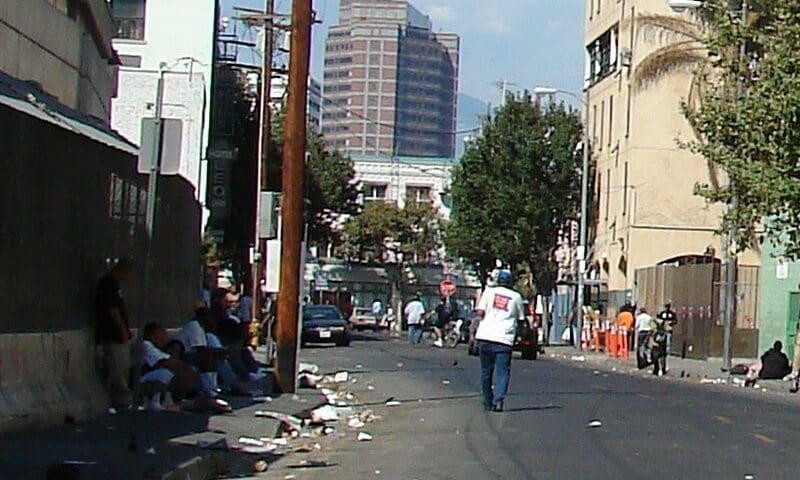
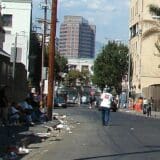
Next week the Los Angeles Alliance for a New Economy (LAANE) and a coalition of faith, labor, environmental and community organizations will hold a major action at L.A. City Hall, where they will release a plan for pulling the city onto a higher and healthier level of civic life.
PROSPER LA — the Program for Shared Prosperity and Environmental Renewal — looks at eight of the region’s core industries (energy efficiency, construction , grocery/retail, ports, tourism, waste and recycling, airline services and home care) that could be the source of a broadly shared economic recovery. The program offers both a positive vision for the future and a ready-made inventory of statistics that show both L.A.’s potential and its warning signs.
Among the facts contained in the PROSPER LA plan:
» Read more about: Sneak Peek: LAANE’s PROSPER LA Blueprint »
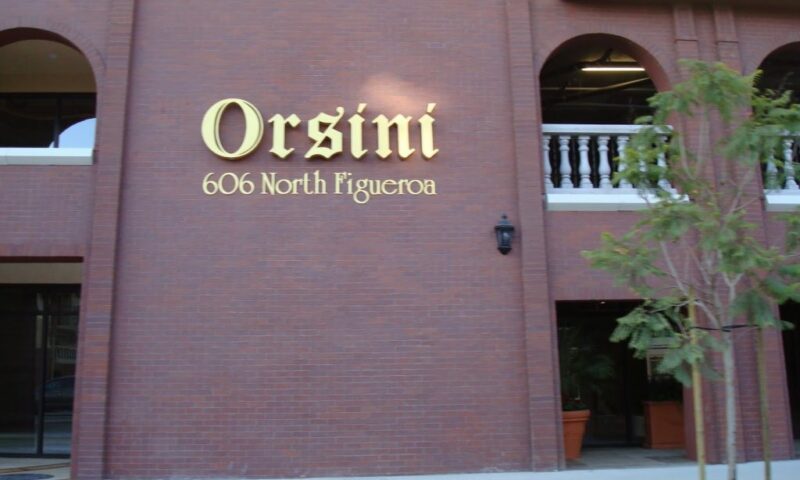

Every time I drive down Sunset Boulevard toward Chinatown, I get really mad. And it’s not only because Walmart wants to move into this neighborhood without extending the most basic community outreach. It’s because of those monstrous, faux-Italian Renaissance apartment buildings that take up blocks of space on what should be Chinatown’s Gateway. Those ugly looking bunkers house hundreds of market-rate apartment dwellers and are called Orsini I, II and III. They are owned by developer Geoffrey Palmer, and the story of how they were allowed to be built is a familiar one in Los Angeles.
A wealthy developer bought some land and wanted to build what he wanted to build. City officials were bullied into believing that there was nothing they could do about it. When Palmer managed to illegally bulldoze Bunker Hill’s last remaining Victorian cottage, the city sued. Palmer counter-sued.


It was quite a sucker punch Walmart landed against the community last week in the über-retailer’s fight to open a 33,000-square-foot store in L.A.’s Chinatown. The shot sneaked in, quick, low and hard–but ultimately didn’t end the match.
The scene last week: Los Angeles City Council chambers in City Hall, minutes before a unanimous March 23 vote on an emergency motion to temporarily ban chain stores (such as Walmart) from opening in the historic Chinatown neighborhood.
Suddenly, a startling announcement by a city bureaucrat—Walmart has obtained the permits needed to move forward in Chinatown—okayed only the day before the critical City Council vote.
The head of L.A.’s Department of Building and Safety himself, Robert R. “Bud” Ovrom, was there to deliver the news and further clarify the situation—namely, that the proposed ban would not interfere with the World’s Largest Retailer’s Chinatown plans.
» Read more about: Chinatown Fight's Still On: Groups Appeal Walmart Permits »


 Assemblymember Allan Mansoor (R-Costa Mesa), elected in 2010, has so far made a career out of demonizing workers and attacking workers’ rights. From collective bargaining to pensions, Mansoor never saw a cherished worker right he didn’t hate. Last year, he even took time to honor anti-union Midwest legislators, whom he calls “courageous” and with whom he stands “in solidarity.”
Assemblymember Allan Mansoor (R-Costa Mesa), elected in 2010, has so far made a career out of demonizing workers and attacking workers’ rights. From collective bargaining to pensions, Mansoor never saw a cherished worker right he didn’t hate. Last year, he even took time to honor anti-union Midwest legislators, whom he calls “courageous” and with whom he stands “in solidarity.”
It’s not surprising, then, that he’s become something of a shill for the campaign to silence workers’ political voice through this fall’s corporate power grab initiative. According to the Pacifica Institute, Mansoor vocally supports the measure, which proponents deceptively call the “Stop Special Interest Money Now Act,” arguing that it will limit “the influence of special interest money.” (Of course nothing could be further from the truth. It’s nothing other than a muzzle on workers that will make our system even more corrupt,


» Read more about: Lalo Alcaraz: The Great Wal-Mart of Chinatown »
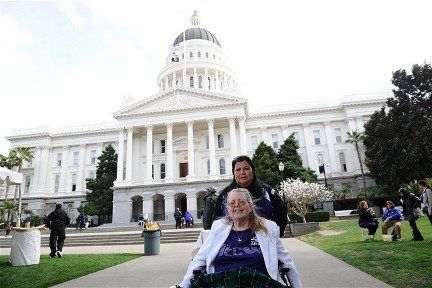
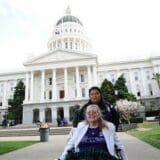
Over 400,000 elderly and disabled California residents depend on the In-Home Supportive Services (IHSS) program to keep them living safely and independently at home. Nearly half this number live in Los Angeles County. Over the last few weeks my colleagues have written articles that illustrate L.A. County caregivers’ need for a living wage and show the positive economic impact of that wage for all L.A. residents.
I am an in-home caregiver for my daughter Elizabeth, who suffers a mental disability. She is 21 years old, has autism and needs fulltime supervision. Any parent who has an autistic child understands the unique challenges we must deal with on a daily basis — such as my daughter needing to go to a special school, having to work with social workers who check in on her, juggling multiple doctors and administering her different medications throughout the day.
» Read more about: Home-Care Workers to Sacramento: Let’s Get Healthy! »


Community members recently wrapped up the three-pronged Long Beach Rising! civic-engagement program aimed at increasing residents’ participation in local politics. I’ve been part of the civic-engagement committee, which formed in November 2011 to address low voter turnout in local elections —particularly from people of color and low-income communities.
From the outset committee members knew we wanted to do something about the persistent disparities in voter participation (and the consequences this has for city policy), but didn’t have a blueprint for this sort of endeavor. So we set out to create one.
From the start there was a high level of enthusiasm, with members from nearly 20 community organizations convening last November to begin planning Long Beach Rising! This process was facilitated by the Long Beach Coalition for Good Jobs and a Healthy Community.
In January, 35 people graduated from our inaugural training program.
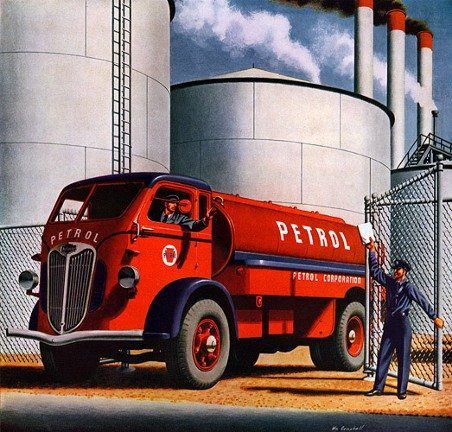

L.A. Observed business writer Mark Lacter recently added his voice to the steadily rising chorus of sane commentators calling for an end to the panic jabber about high gas prices. Conservative politicians have been lustily blaming higher pump prices (along with sun spots) on the Obama administration, but Lacter answers them with an inconvenient truth: Prices have actually leveled off and have even crept down a bit lately. And they’re not all that different from last spring’s:
“If you go back to May, 2011,” wrote Lacter, “an average gallon of regular in L.A. was running nearly $4.30 a gallon, and . . . [t]hat’s not even adjusting for inflation.”
Lacter includes a nifty Washington Post video which posits that part of the panic lies in the psychology of drivers having nothing to do when filling up but stare at those numbers spinning upwards on pumps.
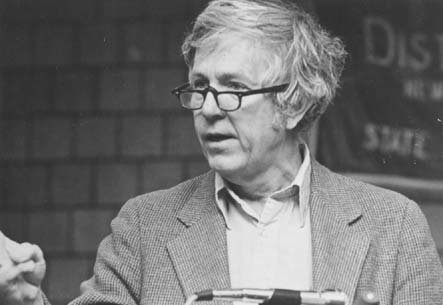

Fifty years ago this month Michael Harrington wrote a book, The Other America: Poverty in the United States – a haunting tour of deprivation in an affluent society – that inspired Presidents John Kennedy and Lyndon Johnson to wage a war on poverty. This slim, 186-page volume became a best-seller and became required reading for social scientists, elected officials, college students, members of study groups sponsored by churches and synagogues, reporters and intellectuals, the new wave of community organizers and the student activists who traveled to the South to join the civil rights crusade. Harrington was soon in great demand as a speaker on college campuses, union halls and religious congregations. Reporters and television talk-show hosts wanted to interview him.
Harrington wrote that the poor were invisible to most Americans because they lived in rural isolation or in urban slums. Once they become aware of the situation, Americans should be ashamed to live in a rich society with so many poor people.
» Read more about: Michael Harrington's Other America: 50 Years Later »


Am I allowed to write this? Is it against company rules? Before I tell you why I ask, let me explain a little about myself.
I’m a split personality of sorts. I’m a diligent employee. I’m always punctual in the RH restaurant where I work as a server at the Hyatt Andaz on Sunset in West Hollywood. I can describe every dish in detail. I enjoy getting to know my guests. I smile. I’m warm. I go above and beyond to offer them a great experience. I have many return guests. Some of them even bring me bottles of wine. I’ll refer to this first character as my “A” personality.
My “B” personality exists outside of the confines of Hyatt. Here are a few character identifiers: He’s a passionate union activist for UNITE HERE Local 11. He shows up extra early to the many rallies, strikes and pickets that are held outside of his place of employment.


You won’t read these headlines in your morning paper: “Public Sector Union Leads on Job Creation and Helping the Environment. Government Agency Exceeds Goals.” Not very good copy from the perspective of opinion writers and editors.
You can’t entirely blame the media. It’s human nature. You notice the power outage, not the lights that go on every day. Still, the constant attacks on the public sector (and public sector employees especially) make it important to point out the things that do work.
So bear with me. Last year, the Los Angeles Department of Water and Power was asked by the city to take charge of an $8.5 million American Recovery and Reinvestment Act program to weatherize the homes of low-income customers. The nonprofits that typically do the work didn’t feel they had the capabilities.
Brian D’Arcy, Business Manager of the International Brotherhood of Electrical Workers Local 18 —
» Read more about: Union and Government Partner for Good of City »


Now that we know corporations are people, it may be time to wonder: Is it possible that corporations have feelings?
Does Walmart, Corporate Person, feel bad as communities reject its plans to move in next door?
If so, the world’s largest retailer is bravely hiding its hurt as it marches, head held high, into Los Angeles’ Chinatown. Community opposition erupted a couple of weeks ago as soon as word got out that Walmart planned a store at Chavez and Grand, but Walmart hasn’t flinched publicly. (Queries to Walmart for this post were not answered by publication time.*)
*Update: Steven V. Restivo Sr., Walmart’s Director of Community Affairs, later responded with this message:
“Now that our Walmart Neighborhood Market has received all necessary approvals, we look forward to serving downtown customers soon. We appreciate all the community support to date and will continue to engage with residents and businesses in the area to talk about the jobs,
» Read more about: Walmart: No Friend to Local Business, Studies Show »
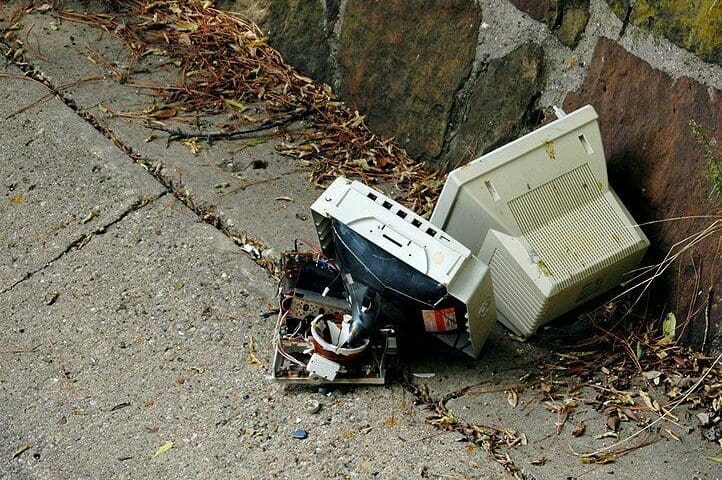
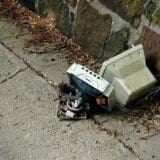
Last week I made up my first Twitter hashtag: #wonkygeekheaven. Which is exactly what the first Los Angeles Good Jobs, Green Jobs conference was for me. There was lots of talk about LAANE’s Don’t Waste LA campaign (which my company, Isidore Electronics Recycling, is a new partner of), passionate discussions with labor and environmental groups, analysis of the economic impact of climate change policy on cities and a rally against a big bad waste company.
Like I said, #wonkygeekheaven.
I never thought I would start an electronics recycling company. But while in my twenties I did a stint in (then) City Council President Eric Garcetti’s office, where I focused on public safety and gang intervention and prevention. There, I saw the same truth over and over: At-risk people and those exiting prison need jobs. I headed to graduate school to figure out how to make that happen,
» Read more about: My Quest for a Greener, Cleaner Tomorrow »


Here’s a story you may not be hearing about anytime soon on KPFK — Pacifica, the nonprofit foundation that runs 90.7 FM in L.A., as well as four other progressive radio stations around the country, has retained a high-powered labor-bashing firm. Jackson Lewis LLC, described by the AFL-CIO as “America’s number one union-buster,” is on the Pacifica payroll. “All we do is work,” its site announces – right next to its “Union Free” portal.
Those with long memories of past internecine battles at Pacifica will hardly be surprised to hear about the latest turn of events. This, of course, makes it no less depressing. At a time when right-wing forces are waging war against the rights of American workers to be represented by a union, now is certainly not the time for Pacifica to side with labor’s antagonists.
» Read more about: WebHot! Surprise (Not): Union Busting at Pacifica Radio »